仔细阅读1
讲师:李婧
存在的问题
- 单词太多;长难句太多——太模糊——太正常 =>别解决
- 不会定位——定位准则
- 定位之后不会选——长难句——化繁为简
- 极限二选一——错误方法造成的
定位逻辑
一、主题词优先
- 主题词(名词词组+重复)
- 题干;第一段;段首段末;主旨句;正确选项
- 公式:
- 主题词+色彩+背景词 = 主旨句
- 主题词1+主题词2 = 因果逻辑
- 提出问题+分析原因+解决问题
- 色彩词——答案——强调词——表示好坏(不一定是颜色)例如:
我爱你色彩词为爱 - 背景词——人;地点;时间;范围
二、主旨句——自带光环
- 喜新厌旧——new;now;today;new research
- 转折词——however;but;
- 提出问题——问号;消极话题;问题(problem;question;issue)
- 色彩一致
技巧总结
技巧1 主题词 = 答案
猜词义 考点 :主题词 = 答案
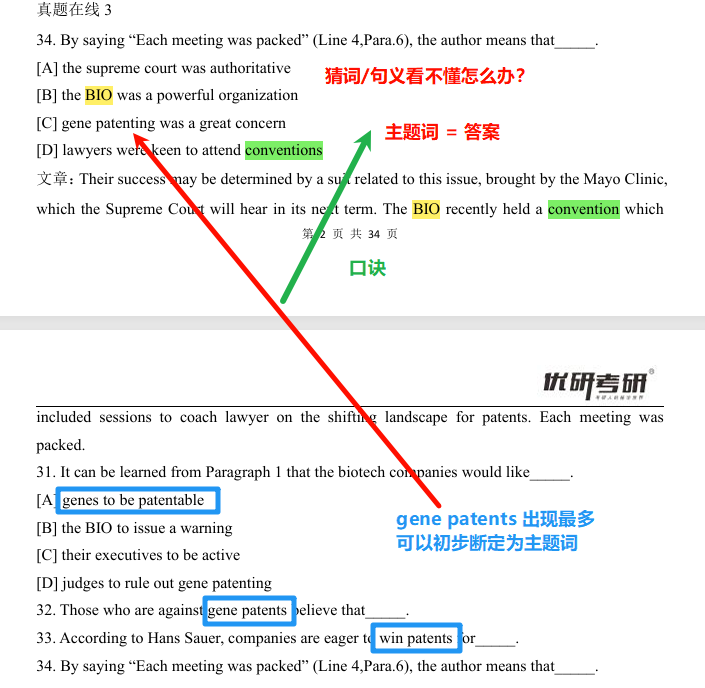
技巧2 特殊疑问词紧跟其后的实词
特殊疑问句 定位,定位词分为三类
- 范围定位
- 精准定位词
- 干扰定位词
定位口诀:填空题一一半句是题干+半句是正确选项 公式:特殊疑问词紧跟其后的实词
定位词 在文章里面没有 =>看选项=>重复最多的是关键词
誓死捍卫主谓宾,名词具有稳定性 =>同义置换
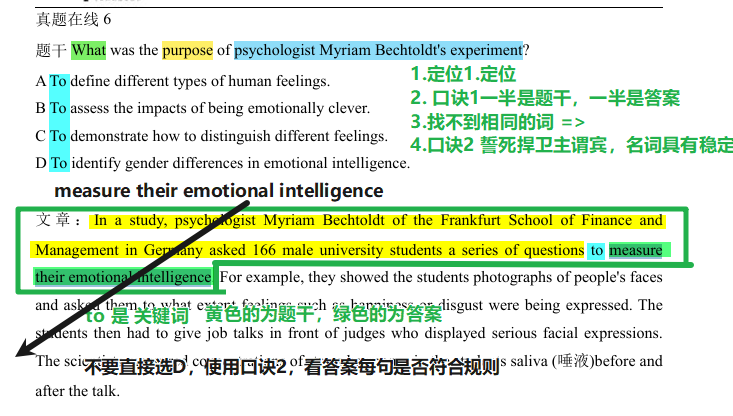
技巧3 空格前面的一个实词
定位公示:空格前面的一个实词
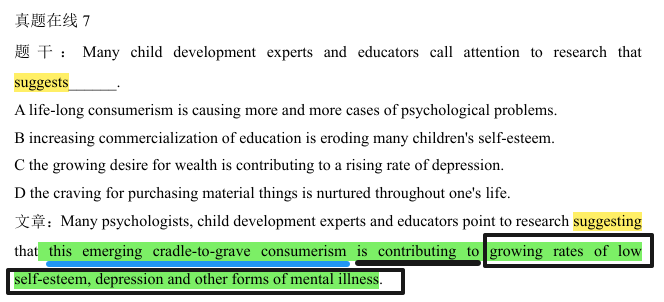
技巧4 定段——定句——定点
定段——定句——定点
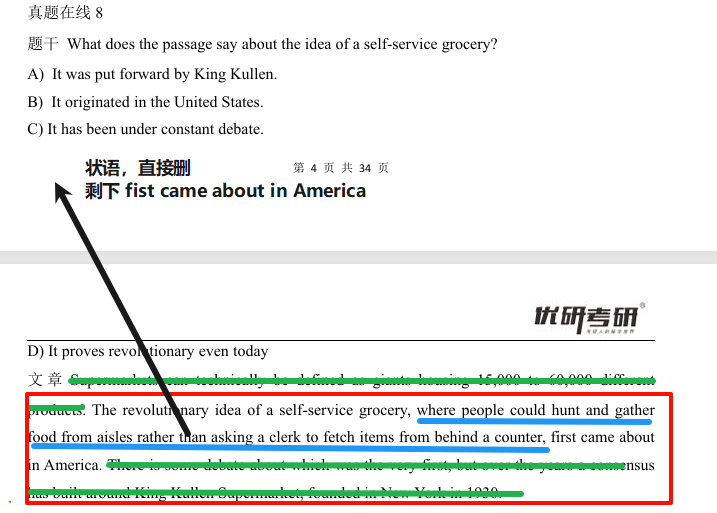
技巧5 why
定位词why(原因——because;reason | 目的:purpose;aim;to)
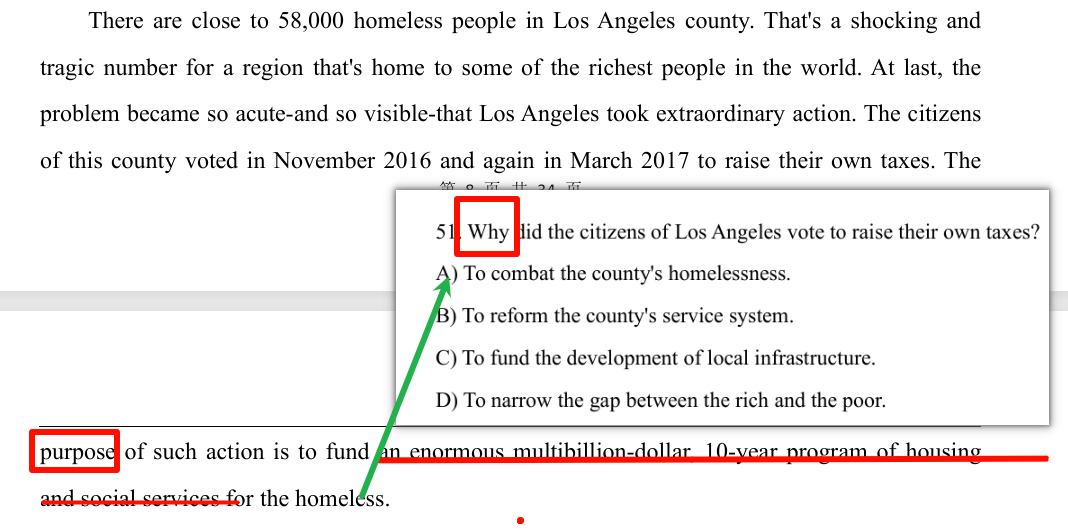
技巧6 题干是文章重要信息的简写
题干是文章重要信息的简写
文章中心考主题;核心词汇考色彩;一一对应考同义
技巧7 内部小but
语法成分和逻辑词:定位句内部有一个小but,but后为答案
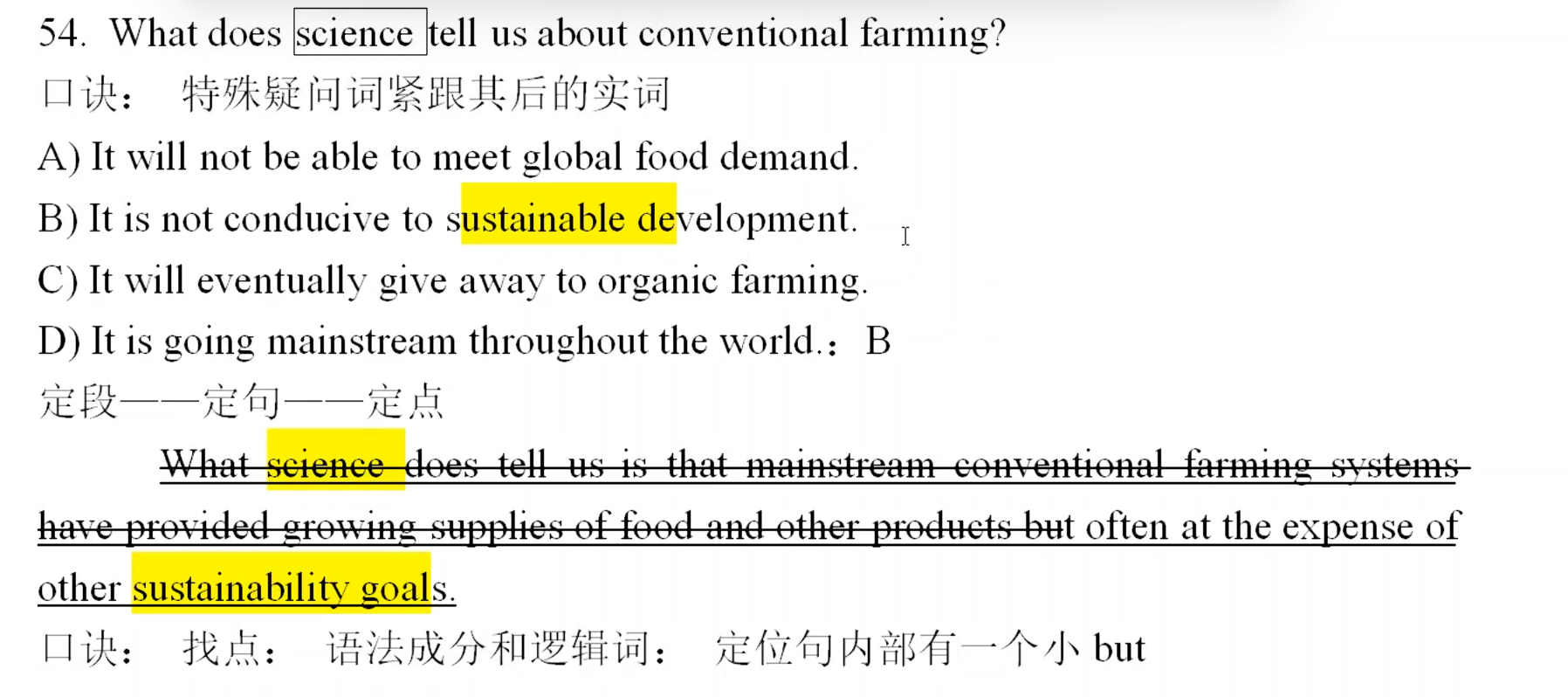
技巧8 精准定位词
- 缩小范围个句子一个点
- 唯一性 (与众不同)
技巧9
at the expense of 以……为代价 = 坏处
作业练习
Recognizing when a friend or colleague feels sad, angry or surprised is key to getting along with others. But a new study suggests that being sensitive to feelings may sometimes come with an extra dose of stress. This and other research challenge the prevailing view that emotional intelligence is uniformly beneficial to its bearer.
In a study, psychologists Myriam Bechtoldt of the Frankfurt School of Finance and Management in Germany asked 166 male university students a series of questions to measure their emotional intelligence. For example, they showed the students photographs of people’s faces and asked them to what extent feelings such as happiness or disgust were being expressed. The students then had to give job talks in front of judges displaying serious facial expressions. The scientists measured concentrations of the stress hormone cortisol in the students’ saliva(唾液) before and after the talk.
In students who were rated more emotionally intelligent, the stress measures increased more during the experiment and took longer to go back to baseline. The findings suggest that some people may be too emotionally clever for their own good, says Bechtoldt. “Sometimes you can be so good at something that it causes trouble,” she notes.
Indeed, the study adds to previous research hinting at a darker side of emotional intelligence. A study published in 2002 in Personality and Individual Differences suggested that emotionally perceptive people might be particularly influenced by feelings of depression and hopelessness. Furthermore, several studies have implied that emotional intelligence can be used to control others for personal gains.
More research is needed to see how exactly the relation between emotional intelligence and stress would play out in women and in people of different ages and education levels. Nevertheless, emotional intelligence is a useful skill to have, as long as you learn to also properly deal with emotions—both others’ and your own, says Bechtoldt. For example, some sensitive individuals may assume responsibility for other people’s sadness or anger, which ultimately stresses them out. Remember, as Bechtoldt says, “you are not responsible for how other people feel.”
1. Why did Myriam Bechtoldt conduct the research
A.To challenge the public assumption.
B.To introduce measures to reduce stress.
C.To assess the impacts of being emotionally clever.
D.To demonstrate how to distinguish different feelings.
2. What does the finding indicate
A.Greater emotional cleverness brings a head start in one’s life.
B.People may suffer from having a high emotional intelligence.
C.People’s psychological well-being is related to various factors.
D.Emotional intelligence means an upper hand in job interviews.
3. What do we learn about emotional intelligence from a number of studies
A.Some people may take advantage of it and benefit themselves.
B.Some people may lack it and are easily influenced by others.
C.People suffering from depression are emotionally immature.
D.People who look at the dark side of life are often depressed.
4. What does the author suggest sensitive individuals do
A.Help people to deal with their troubles in life.
B.Learn to cope with people’s negative feelings.
C.Rid themselves of worries over worldly affairs.
D.Avoid burdening themselves with others’ feelings.